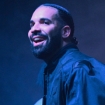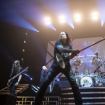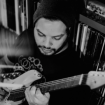Chaney Crabb realized at the age of 13 that she didn't believe in god — at least not in the scriptural sense. "I was going through confirmation, and I had this conversation with my mom about how I didn't want to be confirmed into the church," she says. "But that probably sparked my endless hunt for something more, just having that embedded in my life from an early age — the idea of god."
That sense of self-empowerment, of charting her own philosophical quest, defines the Entheos vocalist's entire life and career. Around the same time she abandoned organized religion, Crabb discovered a different kind of saving grace: metal. She'd grown up absorbing everything from church hymns to her dad's stash of classic rock and country (staples included Fleetwood Mac and Garth Brooks). But once she unlocked her bloodcurdling death-metal scream as an early teen, she never looked back — forming friendships and early bands in the local scene of her native Des Moines, Iowa, best known for spawning Slipknot.
After a stint studying philosophy and psychology in college, Crabb very nearly wound up becoming a teacher. But her path unexpectedly changed after uploading a video to YouTube — a hair-raising vocal audition for Chicago metalcore band Veil of Maya that exploded online in 2014. Throughout the four-minute clip, she paces around a living room with a furrowed brow, intensely double-clutching a microphone — the sort of menacing pose she often adopts onstage. Then there's the voice: "When she screams," says Entheos drummer/producer (and Crabb's boyfriend) Navene Koperweis, "you just kind of can't believe what you're hearing or seeing."
Though she didn't land that coveted Veil of Maya gig, the exposure helped generate substantial buzz. The next year, emboldened by the jaw-dropped web reaction, she and Koperweis — who previously drummed for death-metal act Animosity and prog-metal outfit Animals as Leaders — formed Entheos with ex-Animosity guitarist Frank Costa and the Faceless bassist Evan Brewer.
Propelled by Crabb's viral acclaim and the versatile pedigree of their players, the band seized its moment, issuing the Primal EP in 2015 and embarking on national tours with Whitechapel and the Dillinger Escape Plan, among others. Looking back, Crabb — who currently lives with Koperweis in Santa Cruz, California — marvels at how quickly they climbed the metal rungs. They formed the band with modest goals: play a few local shows, record a low-key demo. But they faced the unexpected challenge of maturing in the public eye: "From the minute we told anyone there was a band, it was a thing," she says. "We didn't expect anyone to care."
Two years later, after showcasing a blend of brutality and technical chops on their 2016 debut LP, The Infinite Nothing, they've ventured into more progressive territory on heavily hyped follow-up Dark Future. One crucial step was recruiting new guitarist Travis LeVrier (formerly of prog-metal group Scale the Summit), whom Koperweis credits with introducing a more "melodic, ethereal" sensibility to offset Entheos' harsher, more technical side. "The best thing about it is the contrast," the drummer says. "It's all four people bringing their own thing to the table, and now for thefirst time, I feel like this is the band."

Where Koperweis spearheaded most of the group's earlier material, the quartet worked as a cohesive unit on Dark Future, bonding over a two-week writing and demoing stint at the drummer and vocalist's home — everyone swapping riffs and melodies and files in one room. "It was true collaboration — pure bliss," Koperweis says, "There are certain parts where I don't even know who wrote it because we were all sitting there and we all contributed a little something to it. We were just having fun, and we never stopped to see how many songs or [how much] music we had. About a week or so in, we were like, 'Hey, let's listen to it all.' And we sat there and listened to it, and it was essentially the album you're hearing now. We were done, and we didn't even realize."
Though Crabb fondly recalls the sessions as some kind of metal summer camp, she spent much of her subsequent creative time in solitude — crafting her lyrics in a semi-meditative state while positioned on a nearby cliff overlooking New Brighton State Beach. "It's about two miles away from our house," she says. "There's an old train track that runs alongside the ocean, and I go there all the time to meditate in a way. I have a cathartic experience every time I'm at that cliff, staring over the ocean and thinking how small I actually am in this incredible world. A lot of the album just came out really naturally at that very spot."
But Dark Future, as the title implies, draws less from oceanic peace than Crabb's deep-seated angst — the same pondering that's always fueled her creative journey.
"I wouldn't call myself atheist, but I don't believe in a certain god at all," she says. "It all goes back to going to church every Sunday — it puts that idea in your head that there's supposed to be something out there that you're doing this all for. But I don't think any of us know at the end of the day, and that's kind of the summation of the lyrics on Dark Future. Reading back, if you follow from beginning to end, it's like experiencing my own existential crisis. The 'dark future' doesn't represent a bad thing — it really just represents the uncertainty of life."
Crabb has been wrestling with unanswerable questions all along — the only difference now is that people are listening. "I've flirted with the thought that all of life is for no reason," she says. "And on the other side — well, surely this all has to be for something greater. But at the end of the day, my personal main goal is to live in the moment and experience everything as it comes. I've come back to that a lot."
And even if Dark Future reflects the angst of the unknown, she's never felt more confident in her place in the world. "I can't remember a life without wanting to have music in it," she says. "I've been screaming since I was 12 years old. There isn't a life for me without metal in it."












